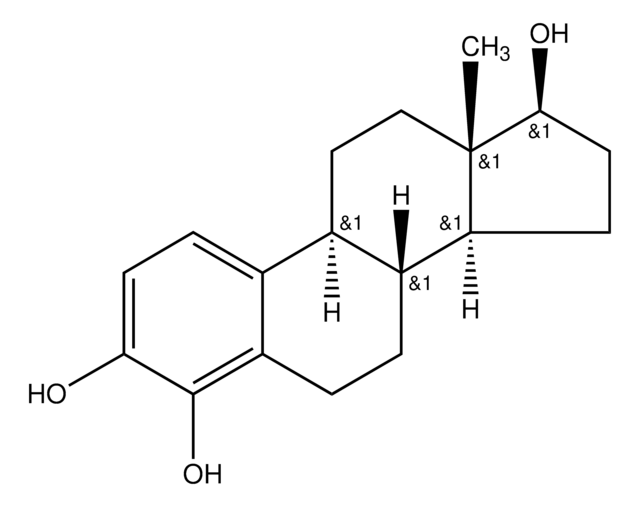H6012
4-Hydroxyestrone
≥90% (HPLC)
Synonyme(s) :
1,3,5(10)-Estratriene-3,4-diol-17-one
About This Item
Produits recommandés
Stérilité
non-sterile
Niveau de qualité
Essai
≥90% (HPLC)
Forme
powder
Solubilité
methanol: 10 mg/mL, clear, colorless to faintly brownish-yellow
Conditions d'expédition
ambient
Température de stockage
−20°C
Chaîne SMILES
[H][C@]12CC[C@]3(C)C(=O)CC[C@@]3([H])[C@]1([H])CCc4c(O)c(O)ccc24
InChI
1S/C18H22O3/c1-18-9-8-11-10-4-6-15(19)17(21)13(10)3-2-12(11)14(18)5-7-16(18)20/h4,6,11-12,14,19,21H,2-3,5,7-9H2,1H3/t11-,12-,14+,18+/m1/s1
Clé InChI
XQZVQQZZOVBNLU-QDTBLXIISA-N
Actions biochimiques/physiologiques
Code de la classe de stockage
11 - Combustible Solids
Classe de danger pour l'eau (WGK)
WGK 3
Point d'éclair (°F)
199.9 °F - closed cup
Point d'éclair (°C)
93.3 °C - closed cup
Équipement de protection individuelle
Eyeshields, Gloves, type N95 (US)
Faites votre choix parmi les versions les plus récentes :
Déjà en possession de ce produit ?
Retrouvez la documentation relative aux produits que vous avez récemment achetés dans la Bibliothèque de documents.
Notre équipe de scientifiques dispose d'une expérience dans tous les secteurs de la recherche, notamment en sciences de la vie, science des matériaux, synthèse chimique, chromatographie, analyse et dans de nombreux autres domaines..
Contacter notre Service technique







